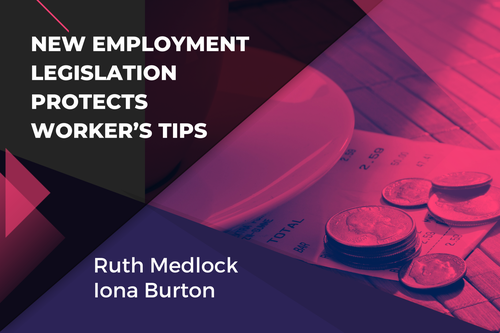
As many may be aware, the Employment (Allocation of Tips) Act 2023 has now received Royal Assent, following its third reading in the House of Commons in January earlier this year. This means that UK employers will now no longer be able to lawfully withhold workers’ tips. This change is predicted to benefit more than 2 million UK workers and means an estimated £200 million a year will be distributed amongst service staff.
The hospitality industry is where tips are most commonly given and is predominantly customer-facing. Tips can be a way to supplement front of house staff’s often low salary and serve as a personal thanks for good service.
With the new legislation, employers will be legally obligated to ensure that their staff are allocated 100% of any tips or service charges and failure to do so could result in an Employment Tribunal claim being brought against the employer.
Key obligations introduced by the new legislation:
- Employers cannot make deductions from tips received (except for tax/NI purposes);
- Records must be kept for 3 years from the date the tip is received by the worker;
- The allocation of tips must occur on premises where the tips were earned;
- Tips must be paid to workers by the end of the following month in which the tip was received;
- Employers must have a policy setting out and explaining how tips will be allocated; and
- Workers will have a right to request more information relating to an employer’s tipping record.
The impact on businesses
With the ongoing cost of living crisis, this new legislation is receiving mixed reviews. The obligation for employers to pay 100% of the tips means that employers are now prohibited from retaining any amount to cover card payment fees and bank charges alike. The knock on effect will mean an increase in administrative fees for businesses.
On the other hand, employees will welcome these efforts to ensure they are financially remunerated for their work and could assist with staff retention in the hospitality industry generally.
How businesses can ensure they are compliant
The overarching aim of this new legislation is to encourage fairness and transparency for workers in tipping sectors. As part of these efforts, employers will be required to draft their own written policy for the allocation of tips between their workers as well as keep a written record of how tips are allocated.
The bill received Royal Assent on 2 May 2023 and it is likely to come into force in 2024. We advise employers to use this time to ensure they have the correct polices and procedures in place and consult with their staff members on the best approach to take for the business.
Our employment team have a vast experience of assisting employers with their obligations towards employees. If you want to discuss how to implement any of these ideas or need some bespoke advice about a specific situation please do not hesitate to get in touch!















